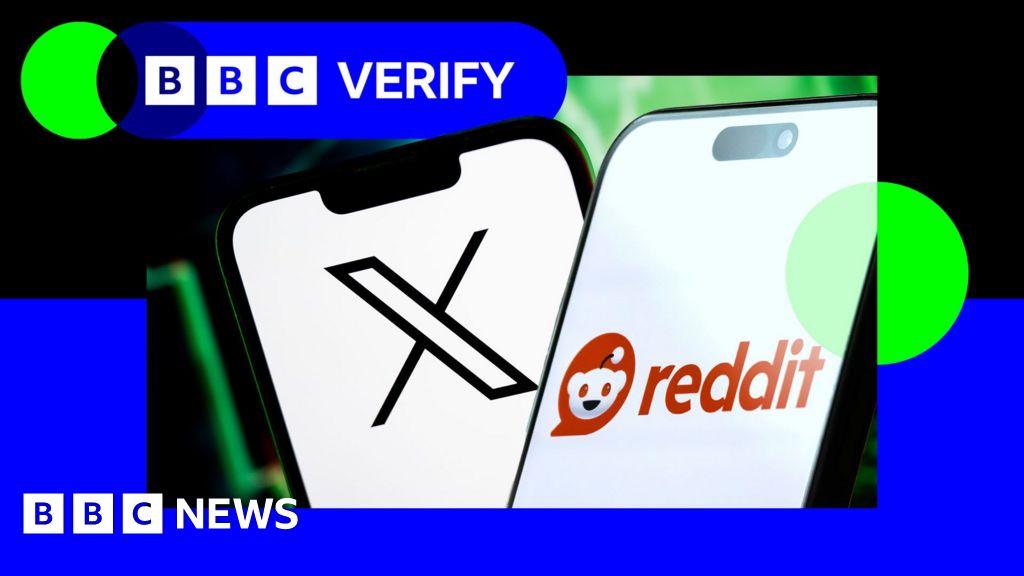Social media companies are blocking wide-ranging content, including posts about the wars in Ukraine and Gaza, in an attempt to comply with the UK’s new Online Safety Act. The new legislation imposes fines on social media companies and other websites which fail to protect under-18s from pornography, posts promoting self-harm, and other harmful content.
BBC Verify found a range of public interest content, including parliamentary debates on grooming gangs, has been restricted on X and Reddit for those who have not completed age verification checks. Experts warn companies are risking stifling legitimate public debate by overapplying the law.
Sandra Wachter, a professor of technology and regulation at the Oxford Internet Institute, expressed alarm at the restrictions and said the new bill was “not supposed to be used to suppress facts of public interest, even if uncomfortable”. Organisations can be fined up to £18m or 10% of their global revenue if they are found to have failed to stop harmful content appearing on their platforms.
Professor Sonia Livingstone, an expert in children’s digital rights at the London School of Economics, said companies might “get better over time at not blocking public interest content while also protecting children” as the law beds in over time. Among the restricted content identified by BBC Verify was a video post on X which showed a man in Gaza looking for the dead bodies of his family buried among the rubble of destroyed buildings.
The same warning was experienced by users who attempted to view a video of a Shahed drone destroyed mid-flight in Ukraine. Reddit has introduced similar restrictions, requiring age checks for some groups when users try to access them via search engines. Clips of parliamentary debates have also been swept up in the restrictions, including a speech by Conservative MP Katie Lam containing a graphic description of the rape of a minor by a grooming gang.
Another post restricted on X shared an image of Francisco de Goya’s 19th-century painting entitled Saturn Devouring His Son. The examples gathered by BBC Verify are largely focused on X and Reddit, as they clearly flag age-restricted content. Meta has a different system whereby ‘teen’ profiles are a different type of account with parental control, making it harder to identify which content is age-restricted.
It is unclear exactly how many posts commenting on debates of public interest are being restricted. X and Reddit did not respond to a request for comment. But Prof Livingstone noted that it was “possible that the companies are over-blocking to undermine the Act”. X owner Elon Musk has been highly critical of the Online Safety Act, launching a stream of attacks against the legislation online and suggesting that it could dissuade companies from launching products in the UK.
Data suggests that the legislation could heavily impact adults in the UK, with large proportions of users accessing these platforms whilst logged out. The Department of Science, Innovation and Technology emphasized that it was up to social media platforms themselves to decide how to implement the requirements of the act, but insisted that the risk-based approach must not “censor political debate”. Ofcom, the UK media regulator tasked with enforcing the act, has warned that firms could face fines not only for failing to protect children but also for breaching freedom of speech under the act.
BBC Verify’s analysis also suggested that the legislation had succeeded in blocking some harmful material online. Since Musk bought X, previously called Twitter, the platform has earned a reputation for being flooded with pornographic material, as well as violent, antisemitic, and racist posts. However, violent and pornographic content was significantly restricted when using an account without age verification.
The new obligations effectively put firms in a position where they must comply with the law. Prof Livingstone suggested that they could still be in a period of “working out how best” to make judgments over the sort of content on their sites, which could be refined over time. But Prof Wachter said that the level of self-regulation afforded to tech companies in choosing how to comply with the Online Safety Act called for well-staffed moderation teams equipped with “time, resources, expertise, and nuance” to effectively make decisions.
She also noted that many major social media companies, such as X and Meta, have slimmed down their moderation teams in recent years or dissolved them completely. “This trend is very worrying when opaque rules are now applied to make these take-down decisions, especially in the current political climate,” Prof Wachter said.
Source link




